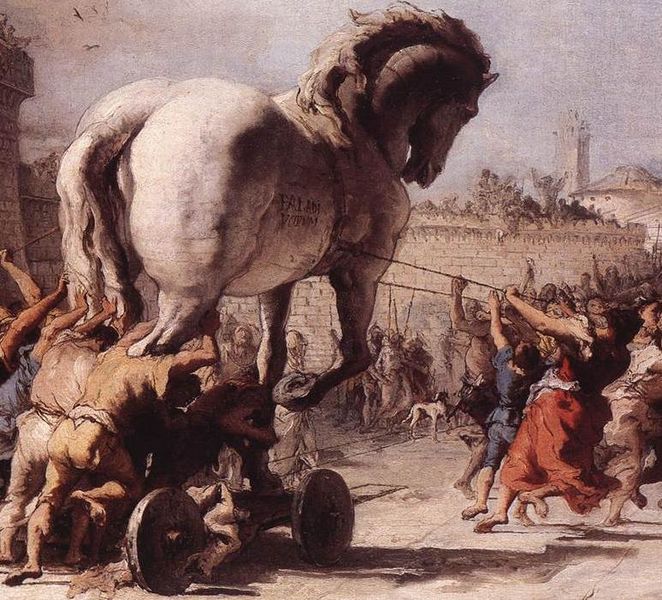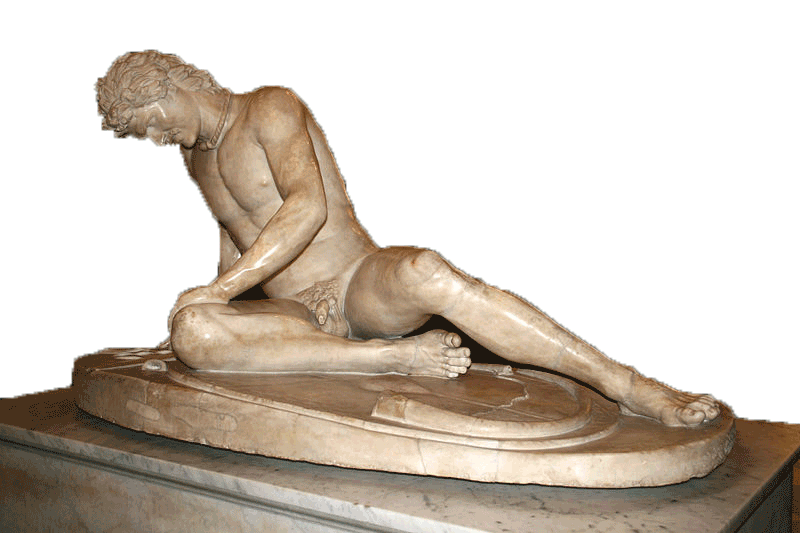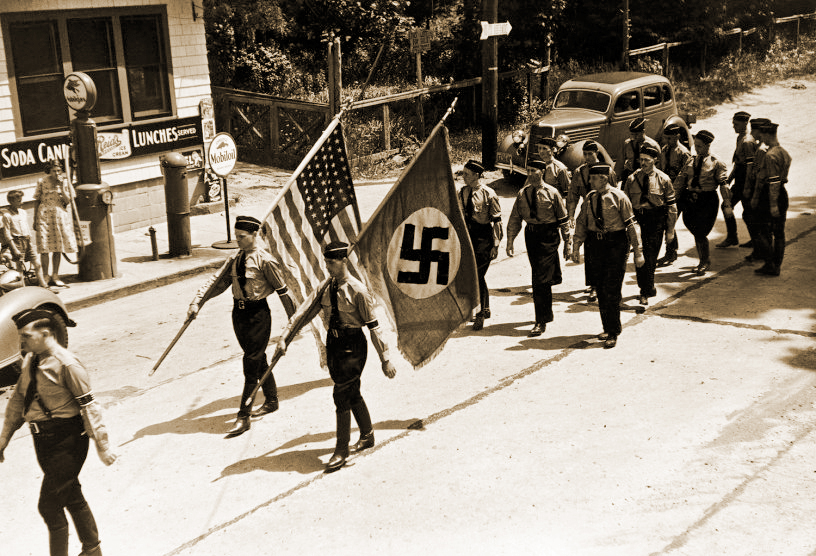It remains nonetheless true that, wherever love is affirmed towards all men, there is intolerance towards all those who conceive ‘human happiness’ differently than the philanthropist who judges them, or who openly declares that they do not care about this happiness.
And this is not only true of the search for bliss in a Hereafter about which, for lack of precise knowledge, it is permissible to discuss indefinitely. It is also about the pursuit of happiness in this world. One might think that this notion is at least quite clear. Isn’t it taken from everyday experience? However, everyday experience, even when it seems identical, does not suggest the same conclusions to all.
A Bedouin who suffers from hunger and an unemployed European (or an old man, unable to live on his miserable little pension) will not react in the same way to their common misery. The first will resign himself to it without a murmur. ‘It was’, he will think, ‘the will of Allah’. The second will say it is ‘the government’s fault’, and will not give in. Complete loneliness, which seems to so many people a torment, seems to others a very bearable state, and to a few, a true blessing.
There is no universal minimum of physical, and especially moral, well-being below which no man can be happy. We have seen people—rare, it is true—that even in the midst of torture maintain a serenity that seemed impossible. And it is in the most prosperous ‘consumer societies’ that youth suicides are, statistically, the most numerous: more than thirteen thousand a year, for example, in Federal Germany, where nothing is lacking materially.
The devotees of human happiness on earth—who, in spite of these facts, are legion—are just as intolerant as the friends of their neighbour concerned, above all, for the salvation of souls. Woe to him who does not think like them! Woe to him in whose eyes the individual is nothing, if they believe that he is everything and that his ‘happiness’ or pleasure comes before everything! Woe to him in whose eyes technical progress, applied to everyday life, is not a criterion of collective value, if they themselves see it as the only basis for discrimination between peoples!
And above all, woe to him who proclaims that certain individuals—including himself—even certain peoples, have more need of faith, enthusiasm, fanaticism, than material comfort, even with the ‘minimum necessary’ of bodily food; if they happen to be the defenders of man; of those whom all fanaticism, and especially all warlike fanaticism, frightens!
To understand how true this is, we need only consider the way in which the Marxists, who, theoretically, raise ‘all workers’ so high, treat the workers and the peasants, as well as the intellectuals, who are not on their side—all the more so those who pretend to actively oppose their system of ‘values’, or even their administration, in the name of these ‘values’ themselves.
One has only to see how so many Christians, theoretically humanitarian, treat, as soon as they are endowed with some power, the Communists, their brethren. We only have to remember how the fighters for the cause of ‘man’, as well Marxists as Christians or Deists, and Freemasons of all stripes, have treated us whenever they could—we, the avowed detractors of any philosophy centred on man and not on life; we whom they accuse of ‘crimes against humanity’, as if we had a monopoly on violence. (These people apparently don’t have a sense of irony.)
If we agree to give the name of tolerance to any non-intervention in the affairs of others, there are two attitudes which deserve this name: that of the indifferent, alien to the problems which preoccupy other men; of one to whom certain areas of human experience, feeling or thought are literally closed, and who does not love any individual or group of individuals enough to seek to place himself in his point of view and to understand it; and that of the man who believes in the indefinite diversity of human races, peoples, persons (even if they are often of the same race) and who strives to understand all cultures, all religions and, to the extent that this is possible, all individual psychologies, because they are manifestations of Life.
The first is the attitude of a growing number of citizens of our ‘consumer societies’, who are not interested in metaphysics, who are ‘cold’ about politics, who are unconcerned by the activities of their neighbours unless, of course, they disturb their way of life and take away some of their little pleasures. This is ‘tolerance’ only through the abuse of language. In good tasty French, this is called je-m’enfoutisme.
The second—true tolerance—is that of Ramakrishna and all Hindus in religious matters. It is that of Antiquity, Aryan as well as Semitic, Amerindian, Far Eastern or Oceanian. It is that of all the peoples before the Christian era, except for one: the Jewish people. (And this tragic exception, which I will talk about again, does not seem to have arisen until quite late in the history of these otherwise insignificant people.) It is that which, in spite of that gradual change of mentality which accompanies, during the same temporal cycle, the passage from one age to the next and meagre human degradation from the beginning to the end of each age, more or less persists, almost everywhere, until the second half, or so, of the last age—of what the Hindu tradition calls Kali Yuga, or Dark Age.
Certainly, the exaltation of man, whatever his race and his personal worth, above all that lives, goes back to the dawn of time. But as long as there remains, among the vast majority of peoples, enough ancient wisdom for everyone to admit that there are fundamental differences between him and others, and so that, far from hating these differences, he observes them with sympathy, at least with curiosity, we can say that our cycle has not yet entered its final phase, the one which will inevitably lead to chaos.
Or, to express my idea in a short phrase and vigorous enough to hold attention, I would say that the superstition of ‘man’ initiates decadence; and that the superstition of human uniformity—uniformity of ‘primary needs’, ‘duties’, etcetera—precipitates it. It is moreover certain that the second superstition proceeds from the first; that it is unthinkable without it. To be convinced of this, it would suffice to notice that the most tolerant religions (and philosophies) are precisely those which are not centred on man, but treat him as a manifestation of life, a product of Nature among many others.
Hinduism (if we except a few sects) has this attitude. Buddhism too. Legend has it that the Buddha had, already in his childhood, resuscitated a swan, killed by the evil Dêvadatta. Legend also relates that ‘in one of his previous lives’, being an ascetic in the forest, he voluntarily stripped himself of the radiance that was sufficient to protect him from ferocious beasts, in order to offer his own body as food to a poor farmed tigress and her cubs. It adds that as greedy fingernails and teeth tore him apart, his heart overflowed with love for the huge beautiful ‘cat’ and her feline curbs.
It should be noted that no miracle, even no good deed and even more so no act of self-denial such as this—in favour of a beast—has been attributed by Christian tradition to Jesus of Nazareth. It should also be noted that, of all the major international religions, only Buddhism has spread without violence. (Hinduism too, professed by so many different races. But I said it before: Hinduism is not ‘a religion’ but a civilisation). Christianity, on the other hand, spread by violence in Germanic and Slavic countries; bit by bit, in the Mediterranean basin, where the number of Christians suddenly soared as soon as the doctrine, hitherto despised, was proclaimed ‘state religion’ by Emperor Constantine, and everyone served his own career by adhering to it.
______ 卐 ______
 Editor’s Note: Precisely because throughout the centuries most western historians have been Christians, Savitri Devi was unaware that in the Mediterranean the conquest of the Classical World was perpetrated with the same violence as Charlemagne would do in the North, and for centuries, since the fourth to sixth and even later, as we have seen in Karlheinz Deschner’s criminal history of Christianity.
Editor’s Note: Precisely because throughout the centuries most western historians have been Christians, Savitri Devi was unaware that in the Mediterranean the conquest of the Classical World was perpetrated with the same violence as Charlemagne would do in the North, and for centuries, since the fourth to sixth and even later, as we have seen in Karlheinz Deschner’s criminal history of Christianity.
Mr. Dickson argues that this easy-way-out mentality means that Americans have always avoided hard choices. Southern slaveholders were never willing to free the slaves and send them back to Africa to build a nation of their own, even though compensated emancipation and colonization would have cost the nation a fraction of the cost of the Civil War. We must delay hard choices no longer. We need a home of our own. Mr. Dickson said that if whites don’t meet this historical challenge to secure self-determination, our children will pay ever higher costs. There remains only one question: How high a price will we have to pay?







